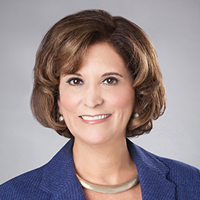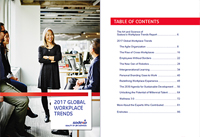The power of personal branding: A new workplace must-have
Interview with Jeanne Meister, Founding Partner of Future Workplace LLC
 Sodexo’s 2017 Workplace Trends Report is hot off the press with 10 major trends that will impact our workplace today and in the years to come. Today we sat down with Jeanne Meister, Founding Partner of Future Workplace LLC, to understand the importance of personal branding.
Sodexo’s 2017 Workplace Trends Report is hot off the press with 10 major trends that will impact our workplace today and in the years to come. Today we sat down with Jeanne Meister, Founding Partner of Future Workplace LLC, to understand the importance of personal branding.
What is a personal brand? And how can individuals improve their own brand?
Jeanne Meister: Individuals need to be aware of the breadth and quality of their LinkedIn connections, be proactive in joining groups and contributing qualitative posts, have a presence on Twitter and be someone who is well respected for sharing high quality content in their area of expertise. All of this contributes to the personal brand you’re developing. And that’s what is going to get you your next job – not your resume, not looking at head-hunter firms. You are now ultimately and thoroughly responsible for being as desirable as possible to any number of organizations that are on the prowl, looking for people with your expertise. All of this creates a public persona which is really a measure of ongoing employability in the job market. I believe this is really a new skill and, moving forward, people need to understand how to excel at it.
This is something that is so important, but we have to ask ourselves ‘Where do you teach it and where do you learn it?’ Because you don’t really learn it in school and it is unlikely that your employer will provide training on personal branding. Individuals need to pull the pieces together themselves. I believe that this is one of the new future job skills that cuts across all levels. It’s as important for millennials who want to grow and develop in their jobs as it is for boomers, such as myself, who want to continue growing and developing in their field of expertise.
How has personal branding changed in the workplace over the past five years, and how is it continuing to become a crucial skill for both employees and recruiters alike?
J.M.: Conventional wisdom says that there are active job seekers and passive job seekers. Traditionally, employers have always been focused on the passive job seekers because they are more desirable as they are happy in their jobs. But today, technology has created a third segment, which we call continuous job seekers – individuals who are constantly keeping their eye on the job market and applying.
We now have mobile apps that follow the Tinder model; meaning you create a profile – what you’re looking for, where you want to work, what your level is – and just like Tinder, you can “swipe right” and be considered for a particular job. So technology has created this notion that is debunking a lot of recruiting myths. Additionally, people aren’t waiting to be approached – they are creating a presence on social media and LinkedIn and developing their personal brand.
Have you noticed any upcoming trends in recruitment methods in the US and abroad?
J.M.: Based on market studies, as well as our own proprietary research, some of the big trends that we’re seeing involve having a mobile-first strategy, which mirrors how retailers manage their strategy. It involves video interviews, which is now overwhelmingly the course of action to sort through numerous candidates who all address the same questions, and the use of predictive analytics, where companies search social media to identify people who have the skill set and personal branding they are looking for in the marketplace.
When we think of personal branding, how much of it is personal versus professional?
J.M.: I think the lines are blurring just like our lives – we no longer work from 9-5 and our work lives are now integrated into our home lives. That said, I think a personal brand that someone creates should be the essence of who they are, both in their personal and professional lives.
I can remember just five years ago when I had clients both on LinkedIn and Facebook and I got emails saying “don’t take it personally, but I’m de-friending you on Facebook because I’ve decided that Facebook is for my family and LinkedIn is for my professional colleagues.” Well that doesn’t happen anymore. Everything is seamless and integrated. This is the brand and the presence of who you are putting out there to the world. If you are authentic, it should be the same brand you’re showing the world.
It sounds like the personal branding trend is really pushing for more authenticity. Does one lead to the other?
J.M.: Definitely. I think authenticity is so important these days. Take for example Marc Beinoff, who is making a case for closing the gender gap. He has made it part of his personal brand, as well as the employer brand of Salesforce.com. There are several other CEOs that have become social activists – involving their personal brand and employer brand in key issues because they know they have the power to start a conversation. Another example is the CEO of H&M, who has begun discussions with the prime minister of Bangladesh on wage laws. One third of H&M clothing is made in that country and the brand is now focused on ensuring the safety of the workers. I think we’re going to see more of this. We see it at the CEO level and we’re going to see it at every level. It’s almost gotten to the point where if you don’t take a stand on an issue that’s really important to you, people start wondering what’s the matter with you?
There seems to be a certain level of optimism that these trends are going to make the world a better place as opposed to a more superficial, distant place. Can you share your thoughts on this?
J.M.: I definitely agree. I am very optimistic. This is a case where technology is favourably impacting people’s lives. We hear so much about technology taking people’s jobs away and disrupting. This is an example of that not being the case – it has the potential to really make lasting change.
Jeanne Meister, Partner, Future Workplace and co-author, The Future Workplace Experience: 10 Rules For Mastering Disruption In Recruiting and Engaging Employees
Follow Jeanne on Twitter at @jcmeister


